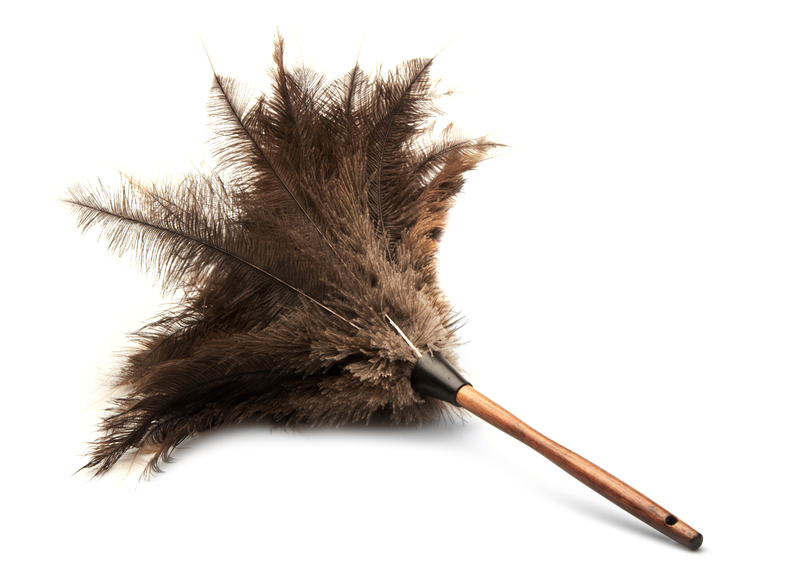Enjoy a Fresh Smelling Home with These Pet Odor Solutions
Posted on 05/09/2025
Enjoy a Fresh Smelling Home with These Pet Odor Solutions
Pets are wonderful companions that bring joy, comfort, and unconditional love to our lives. However, as much as we adore our furry friends, one universal challenge pet owners face is maintaining a fresh smelling home. Pet odors can infiltrate every corner of your living space, affecting the atmosphere and comfort of your home. Whether it's persistent cat urine, wet dog smell, or the subtle presence of animal dander, pet-related odors can be tough to eliminate. Fortunately, with the right pet odor solutions, you can enjoy a clean, inviting, and odor-free house.
Understanding the Source of Pet Odors
Before tackling pet odors, it's crucial to understand what causes them. Pet odors typically stem from:
- Urine and feces accidents (especially among puppies, kittens, or senior pets)
- Pet dander (tiny flecks of skin shed by cats and dogs)
- Saliva (which contains proteins that can linger and smell)
- Wet fur (moisture can cause bacteria to multiply, leading to that "doggy" aroma)
- Unwashed bedding and toys
- Dirty litter boxes or cages
Identifying the source is essential for choosing the most effective pet odor eliminator methods for your home.

The Importance of Addressing Pet Odors
Ignoring pet odors isn't just a matter of comfort--it can also impact your health and relationships. Persistent pet smells can:
- Cause embarrassment when guests visit
- Trigger allergic reactions in sensitive individuals
- Attract pests such as flies and rodents
- Lower the air quality in your homes
By applying effective pet odor removal techniques, you'll not only create a welcoming environment for family and friends, but also foster a healthier space for both you and your pets.
Comprehensive Pet Odor Solutions for a Fresh Home
Ready to banish pet smells for good? Explore these pet odor solutions to enjoy a fresher, cleaner home:
1. Prompt Cleaning of Accidents
Immediate attention is vital when your pet has an accident. The longer urine or feces sits, the deeper it seeps into carpets, fabrics, and floors, making odor removal tougher.
- Blot up liquids right away with paper towels or an absorbent cloth.
- Avoid rubbing the stain as this drives the odor further into fibers.
- After removing excess moisture, treat the area with a pet-friendly enzymatic cleaner that breaks down odor-causing proteins at the molecular level.
Enzyme-based cleaners are highly effective for cat urine odor removal and other stubborn odors most conventional cleaning products miss.
2. Daily Pet Grooming
Regular grooming not only keeps your pet healthy, but it's also essential for odor control.
- Brush your pet's coat daily to remove dirt, loose hair, and dander.
- Bathe your pet as needed--using a pet-safe shampoo formulated for your animal's needs.
- Do not over-bathe, as this can dry out skin and worsen shedding or odor problems.
Keeping your pets clean is a natural and gentle way to maintain a fresh smelling house with pets.
3. Washing Bedding and Fabrics Regularly
Pet beds, blankets, and soft toys can trap odors. Launder them weekly in hot water with an unscented detergent. Add a cup of white vinegar to the rinse cycle for extra deodorizing power.
- Dry thoroughly to prevent mildew growth.
- Consider using washable covers for easier cleaning.
Don't forget to vacuum your upholstery, drapes, and pillows frequently to keep your whole home free from pet odors.
4. Efficient Litter Box and Cage Maintenance
For cat owners, litter box odor is a common issue. Small pets like rabbits, hamsters, and birds also require clean cages for odor prevention.
- Scoop litter boxes daily and replace all litter weekly.
- Clean cages at least once a week, and spot-clean as needed.
- Use a high-quality litter with odor-absorbing properties (clumping clay, silica gel, or natural pine/corn blends).
- Periodically wash litter boxes and cages with warm soapy water--and rinse thoroughly!
You may also sprinkle some baking soda in the litter or cage tray to absorb odors naturally.
5. Pet Odor Neutralizers and Air Purifiers
Commercial pet odor neutralizers can effectively combat lingering smells. Choose products with activated charcoal or enzyme-based ingredients for best results.
- Place activated charcoal bags in rooms where pets spend time to absorb odors passively.
- Plug in an air purifier with a HEPA filter to remove pet dander, allergens, and other airborne contaminants.
These methods not only enhance whole house pet odor elimination but also improve indoor air quality overall.
6. Floor and Carpet Deep Cleaning
Carpets, rugs, and hardwood floors absorb pet smells. Deep clean your floors every few months for optimal freshness.
- Use a carpet cleaner with pet-specific shampoo to lift odors from deep in carpet fibers.
- For hardwood or tile, mop using an enzymatic cleaner or a mix of vinegar and water.
- Area rugs can be taken outdoors for sunshine and air, which naturally deodorizes fabric.
Pro Tip: Hire a professional carpet cleaning service yearly for a truly deep clean, especially if you have multiple pets or persistent odors.
Natural and DIY Pet Odor Removal Methods
If you prefer natural solutions, there are several DIY pet odor remedies you can try:
1. Baking Soda
Baking soda is a powerful and inexpensive pet odor remover. Sprinkle it liberally onto carpets, rugs, or furniture, let it sit for 15-30 minutes, and then vacuum it up. Baking soda neutralizes odors instead of masking them.
2. White Vinegar
Mix equal parts white vinegar and water in a spray bottle for a multi-purpose deodorizer. This solution is excellent for hard surfaces, litter trays, or pet accidents on floors. The vinegar smell dissipates as it dries, taking pet odors with it.
3. Essential Oils (Used with Caution)
Certain essential oils can help neutralize odors, but always use them with caution around pets. Dogs and cats have sensitive respiratory systems and some oils are toxic to them. Popular safe choices (in well-ventilated areas and diluted properly) are:
- Lavender
- Chamomile
- Cedarwood
Always check with your veterinarian before introducing new scents in your pet's environment.
4. Lemon and Citrus Sprays
A fresh-smelling spritz can be created with lemon juice and water. The acidity of citrus helps break down odor molecules without harmful chemicals.
5. Sunlight and Fresh Air
One of the oldest tricks for a clean smelling home with pets is to open windows and allow sunlight and fresh air to circulate. Sunlight naturally kills odor-causing bacteria, and ventilation prevents musty smells from building up.
Preventing Future Pet Odors: Pro Tips
- Train your pets to use designated bathroom areas for fewer accidents.
- Establish house rules about where pets are allowed (for example, keeping them off the couch or out of bedrooms).
- Feed pets a quality diet--digestive health impacts stool and urine smell.
- Schedule regular veterinary check-ups; some health issues (ear infections, dental problems, skin conditions) can also cause unusual odors.
- Keep your home organized and clutter-free, reducing places for odors to linger.
By incorporating these habits, you'll support a routinely fresh scented home that's pleasant for everyone.
Common Mistakes to Avoid when Removing Pet Odors
While battling pet odors, it's easy to make mistakes that make the situation worse. Be mindful of these common pitfalls:
- Masking odors with air fresheners instead of eliminating the source.
- Ignoring hidden stains under furniture or in corners.
- Using ammonia-based cleaners (which may encourage pets to re-mark the same spot).
- Over-wetting carpets during cleaning, which can lead to mold and mildew.
- Believing odor removal is a "one and done" process--consistency is key!
The Ultimate Cleaning Checklist for Homes with Pets
For ongoing freshness, use this cleaning routine:
- Vacuum all floors, upholstery, and curtains at least twice a week.
- Air out the house by opening windows daily.
- Wipe down pet food and water bowls regularly.
- Wash pet bedding, towels, and plush toys weekly.
- Scoop litter boxes and clean cages every day.
- Use pet-safe air purifying solutions or activated charcoal bags in every room.
- Clean collars, harnesses, and leashes monthly.
- Check for hidden messes in corners and under furniture regularly.
Sticking to this pet odor cleaning routine will help you enjoy a home that always feels (and smells) guest-ready!

Choosing the Right Odor Eliminator for Your Home
With so many pet odor eliminators on the market, it's important to select one that suits your needs:
- Enzymatic cleaners: Best for organic stains (urine, poop, vomit)
- Activated charcoal air purifiers: Great for ongoing odor absorption
- HEPA air purifiers: Excellent for households with allergies or sensitive individuals
- DIY options: Baking soda, vinegar, and citrus are effective and budget-friendly
- Fragrance-free products: Preferred if you or your pet is sensitive to scents
Always double-check that any solution you use is safe for your specific pet species!
Conclusion: A Home That Smells As Good As It Feels
Sharing your home with pets doesn't mean sacrificing a fresh atmosphere. With proactive habits and the right pet odor solution strategies, you can enjoy cuddles and playtime without worrying about lingering smells. From immediate cleaning of accidents to using natural deodorizing ingredients and keeping up with a regular cleaning routine, these techniques will transform your home into a clean, fresh-smelling sanctuary for both you and your animals.
Embrace these tips, and you'll discover that living with pets and maintaining a fresh smelling home can go paw in paw! If you have favorite pet odor removal tips, share them in the comments below and help other pet parents enjoy odor-free homes, too.




